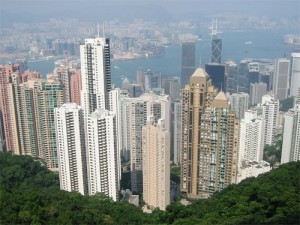
Hong Kong rose to great heights due in part to the unusual governing agreement between China and Britain.
The amazing Arts & Letters Daily referred me to an article in the British journal Prospect about a new and improved type of urban development in poor countries. The piece, “For Richer, For Poorer, authored by Stanford economist Paul Romer, is an in-depth look at the possibilities and perils of his pet project, Charter Cities.
Instead of richer countries sending aid down a sinkhole in poorly managed, impoverished cities. Romer contends that a charter be set up between a developed and underdeveloped country allowing the more prosperous nation to begin a new city with brand new rules on uninhabited land. Those who wish to migrate to the new city would be welcome to participate in the building of the urban environment.
I think the economist may be underestimating the will of many governments to keep their people poor and powerless to maintain their own positions, but it certainly can’t hurt to try. Perhaps a couple of successes will entice poor but basically benign societies to participate.
Romer uses the histories of Hong Kong and Mauritius for important lessons in how Charter Cities can succeed. An excerpt from his writing about Hong Kong:
“Hong Kong was a successful example of a special zone that could serve as a model for charter cities. In the 1950s and 1960s, it was the only place in China where Chinese workers could enter partnerships with foreign workers and companies. Many of the Chinese who moved to Hong Kong started in low-skill jobs, making toys or sewing shirts. But over time their wages grew along with the skills that they gained working with educated managers, and using modern technologies and working practices.
Over time they acquired the values and norms that sustain modern cities. As a result, Hong Kong enjoyed rapid economic growth.
Even if it had wanted to, the Chinese government acting alone could not have offered this opportunity. The credibility of rules developed over centuries by the British government was essential in attracting the foreign investment, companies and skilled workers that let these low-skill immigrants lift themselves out of poverty. As in Mauritius, authority rested ultimately with the British governor general, but most of the police and civil servants were Chinese. And the benefits demonstrated in Hong Kong became a model for reform-minded leaders in China itself.”
Tags: Paul Romer
